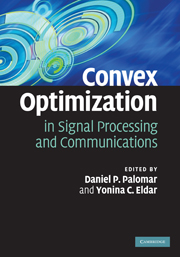Book contents
- Frontmatter
- Contents
- List of contributors
- Preface
- 1 Automatic code generation for real-time convex optimization
- 2 Gradient-based algorithms with applications to signal-recovery problems
- 3 Graphical models of autoregressive processes
- 4 SDP relaxation of homogeneous quadratic optimization: approximation bounds and applications
- 5 Probabilistic analysis of semidefinite relaxation detectors for multiple-input, multiple-output systems
- 6 Semidefinite programming, matrix decomposition, and radar code design
- 7 Convex analysis for non-negative blind source separation with application in imaging
- 8 Optimization techniques in modern sampling theory
- 9 Robust broadband adaptive beamforming using convex optimization
- 10 Cooperative distributed multi-agent optimization
- 11 Competitive optimization of cognitive radio MIMO systems via game theory
- 12 Nash equilibria: the variational approach
- Afterword
- Index
6 - Semidefinite programming, matrix decomposition, and radar code design
Published online by Cambridge University Press: 23 February 2011
- Frontmatter
- Contents
- List of contributors
- Preface
- 1 Automatic code generation for real-time convex optimization
- 2 Gradient-based algorithms with applications to signal-recovery problems
- 3 Graphical models of autoregressive processes
- 4 SDP relaxation of homogeneous quadratic optimization: approximation bounds and applications
- 5 Probabilistic analysis of semidefinite relaxation detectors for multiple-input, multiple-output systems
- 6 Semidefinite programming, matrix decomposition, and radar code design
- 7 Convex analysis for non-negative blind source separation with application in imaging
- 8 Optimization techniques in modern sampling theory
- 9 Robust broadband adaptive beamforming using convex optimization
- 10 Cooperative distributed multi-agent optimization
- 11 Competitive optimization of cognitive radio MIMO systems via game theory
- 12 Nash equilibria: the variational approach
- Afterword
- Index
Summary
In this chapter, we study specific rank-1 decomposition techniques for Hermitian positive semidefinite matrices. Based on the semidefinite programming relaxation method and the decomposition techniques, we identify several classes of quadratically constrained quadratic programming problems that are polynomially solvable. Typically, such problems do not have too many constraints. As an example, we demonstrate how to apply the new techniques to solve an optimal code design problem arising from radar signal processing.
Introduction and notation
Semidefinite programming (SDP) is a relatively new subject of research in optimization. Its success has caused major excitement in the field. One is referred to Boyd and Vandenberghe [11] for an excellent introduction to SDP and its applications. In this chapter, we shall elaborate on a special application of SDP for solving quadratically constrained quadratic programming (QCQP) problems. The techniques we shall introduce are related to how a positive semidefinite matrix can be decomposed into a sum of rank-1 positive semidefinite matrices, in a specific way that helps to solve nonconvex quadratic optimization with quadratic constraints. The advantage of the method is that the convexity of the original quadratic optimization problem becomes irrelevant; only the number of constraints is important for the method to be effective. We further present a study on how this method helps to solve a radar code design problem. Through this investigation, we aim to make a case that solving nonconvex quadratic optimization by SDP is a viable approach.
- Type
- Chapter
- Information
- Convex Optimization in Signal Processing and Communications , pp. 192 - 228Publisher: Cambridge University PressPrint publication year: 2009
- 6
- Cited by

